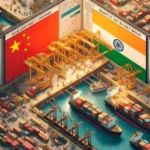Summary:
• From Humble Beginnings: Founded in 1988, BlackRock grew from a $5M startup into a $7 trillion juggernaut.
• Global Powerhouse: BlackRock holds major stakes in everything from Nike and Nestlé to Ferrari and JPMorgan.
• Rising Influence: Growing Concerns – Critics warn of the dangers of so much corporate power concentrated in one firm’s hands.
BlackRock Inc. may not be a household name, but it might as well own the household. The world’s largest asset manager, BlackRock, controls over $7 trillion in assets and holds significant stakes in nearly every major sector, from food and fashion to finance and fitness. Its rise, while steady and often behind the scenes, has transformed it into one of the most powerful financial entities on Earth.
Founded in 1988 by Larry Fink and a small team of co-founders, BlackRock began as a modest risk management firm known as Blackstone Financial Management. With backing from the private equity firm Blackstone Group, the company initially focused on fixed-income investing, particularly mortgage-backed securities. By 1992, the firm had broken away to form what we now know as BlackRock.
Through strategic mergers and acquisitions in the early 2000s, including Merrill Lynch Investment Managers and Barclays Global Investors, BlackRock quickly vaulted to global dominance. The firm also pioneered the now-ubiquitous Shares exchange-traded funds (ETFs), a passive investing tool that helped drive its scale and profits to new heights.
Today, BlackRock’s portfolio reads like a who’s who of global corporate power. It is a top shareholder in companies like Nike, Adidas, Nestlé, PepsiCo, JPMorgan, L’Oreal, Ferrari, and even Manchester United. In many cases, it owns more than 5% of the company and sometimes more than 10%.
The scale of its reach is staggering. In beauty, it holds massive stakes in L’Oreal, Estee Lauder, and Ulta. In construction and infrastructure, it’s a leading investor in Vinci, AECOM, and Quanta Services. BlackRock even has significant ownership in luxury brands like LVMH, Gucci’s parent company Kering, and Ferrari. It also holds large blocks in major global banks, from JPMorgan Chase to Barclays.
This has led to growing scrutiny. Critics argue that BlackRock’s giant shareholding portfolio gives it unmatched influence, potentially suppressing competition and corporate power in too few hands. Detractors also worry about its ability to steer the direction of entire industries, especially through passive investing, where shareholder influence may go unchecked.
Supporters, however, defend BlackRock’s long-term approach and its passive investing model, which they argue minimizes interference in company operations. The firm has also adopted ESG (Environmental, Social, and Governance) goals and sustainable investing, although this approach has attracted criticism from both the political left and right.
Still, BlackRock’s influence is undeniable. It is not just a financial firm; it is a behind-the-scenes force reshaping the capitalist system. Whether that’s a good thing or a dangerous consolidation of power is still a matter of debate.








